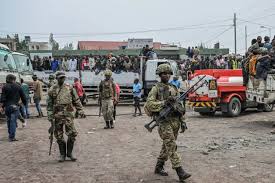
Dawn broke over Lake Kivu with the sound of gunfire as M23 rebels seized control of Nyabibwe, shattering hopes raised by their recent ceasefire declaration. The strategic mining town fell after four hours of intense fighting, marking another significant advance in the rebels’ southward push through eastern Congo.
The capture of this vital commercial hub, known for its gold and coltan deposits, positions the rebel forces closer to their potential next target: the provincial capital of Bukavu. This latest offensive comes mere days after the rebels took Goma, escalating a conflict that has already displaced hundreds of thousands.
Behind the military maneuvers lies a complex web of regional tensions. Congo points accusing fingers at Rwanda, claiming their neighbor uses M23 as a proxy to plunder mineral wealth. Rwanda counters with claims of self-defense and protection of ethnic Tutsis.
In Goma, the human toll continues to mount. UN officials estimate at least 2,800 deaths, while humanitarian workers struggle to assess the full scope of the devastation. The city’s infrastructure bears deep wounds – hospitals overflow, buildings lie in ruins, and the Red Cross reports its looted medical warehouse will take months to restore.
Bishop Willy Ngumbi, surveying damage to a maternity ward, voiced the region’s growing desperation, calling for urgent talks between Congo, Rwanda, and Burundi. Meanwhile, in Kinshasa, lawmakers huddle behind closed doors, preparing for a crucial regional summit that could determine the conflict’s trajectory.
